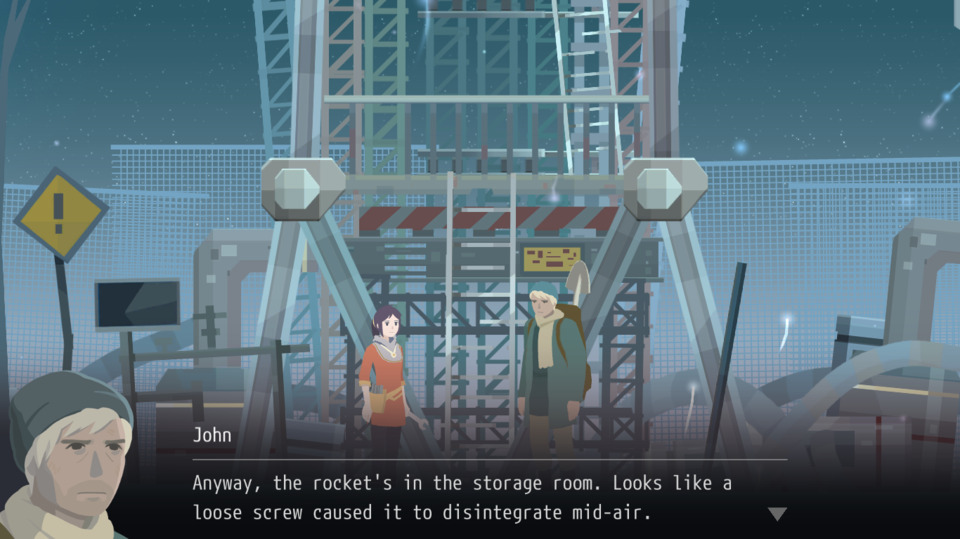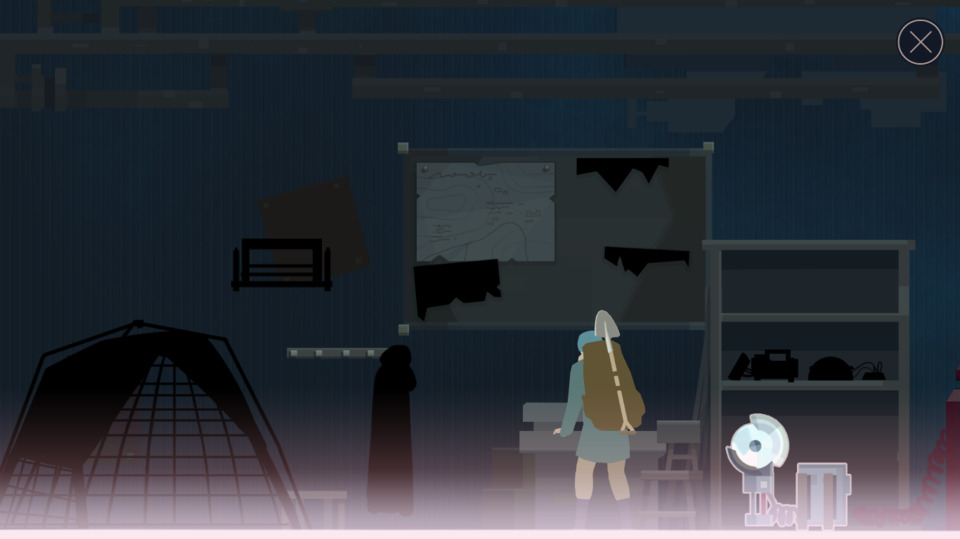Indie Game of the Week 235: Opus: Rocket of Whispers
By Mento 3 Comments

Occasionally, I'll find pre-pandemic video games (and other popular culture) that so perfectly encapsulates our current era that I wonder if the creators retroactively feel a little weird about it. Opus: Rocket of Whispers follows Sigono's previous work, Opus: The Day We Found Earth, in a thematic sense if not necessarily directly: with The Day We Found Earth, it was about rediscovering the cradle of life at some distant point in the future where thousands of years of space colonization has left our pale blue dot mostly forgotten, while in Rocket of Whispers there's a more spiritual side to the idea that - upon death - any deceased human being longs to return to mother Earth by taking a long trip home through the cosmos in their spectral forms. To do that, however, they first need to escape their current planet's gravity: a service performed by rocket-powered "space burials."
Alas, the setting of Rocket of Whispers was hit by a deadly plague (cue this meme given current events) and almost everyone is dead. This creates something of an issue with the space burial business, not only because it took a considerable number of people working in different industries to make all those rockets happen but that there's also something of a phantasmal backlog floating around waiting for the next deliverance launch. Two of the remaining survivors - and possibly the only humans left alive - include the son of one of the more famous rocket engineers who was orphaned and abandoned by the moving populace of his hometown long before he could be trained in the related academia, and a "witch": the spiritual leader of her people who at least has some knowledge of rocket science who was cryogenically frozen for twenty years so she might survive the epidemic. Both have been haunted figuratively by years of loneliness and literally by the many tortured spirits still aimlessly wandering around since disease and/or the connected social upheaval took their lives all those years ago.

For all its death and despair Rocket of Whispers remains a very hopeful game. While many rockets have yet to escape the surly bonds of wherever-this-is since the witch, Fae, and the engineer's son, John, started working together, the former has yet to give up hope that one last space burial is within reach. John, the protagonist, is a little more cynical: he's familiar with the local industries and knows where best to salvage parts for the rockets, but each failed launch and irascible phantom breathing down his neck puts him closer to the end of his tether. He still goes out looking for rocket parts every day for Fae's sake, their relationship not wholly friendly or romantic initially but borne of a similar desperation to see these spirits put to rest with a successful burial, and that prickly relationship becomes a pillar of the game's ongoing story. The actual gameplay involves setting out from your home base each day to look for parts in the nearby ruins of civilization: some finds are generic scrap that you need in large quantities to build much of anything, some are the specific rocket parts you need that require you go further afield to find each time, and the rest are relics and keepsakes left behind by those that once lived nearby that John (and the player) can choose to spend some small amount of resources to repair and enshrine as mementos of the fallen. Those mementos make up the larger, optional part of the game's salvage collectathon approach, and while they're not necessary to see the ending it looks like finding and restoring them all will unlock some sort of post-script bonus.
The director commentary, available after completing the story, goes into more detail on this salvaging aspect: they were originally planning to make it a much more severe survival game, since the game is set during a frosty winter in a world already suffering from environmental collapse - it's implied that the first visitors to this planet, which to reiterate is not Earth, built some sort of terraforming regulator for the weather which has since fallen into disrepair with no-one to maintain it - and you frequently take damage from random events while exploring. The worst getting hurt seems to do is waste the day however, and if there's a game-wide time-limit I didn't bump into it. The day will eventually end after enough time has passed regardless, and John is reluctant to go exploring at night due to the low temperatures and the higher density of wandering spirits (some of which are hostile and cause harm, but only because they're a little more impatient about being launched into space than most). At the end of a day's cycle, you can assign Fae to building the next part of the current rocket if you found the parts for her, or John can either restore a memento or create a new piece of equipment that will allow him to explore further afield: this process starts with a metal cutter that gets him past wire fences, and eventually also includes fast-travel maps and a camping tent to let him stay out two days instead of one - useful when you're moving further and further away from your home base with each trip.

This cycle of salvaging is appealing enough from a purely kleptomania angle though it can be hard to make out what's important while exploring. The game has a zoomed-out top-down view of John and the local environment, and any points of interest are represented the same way ghosts are: a set of floating orbs of various colors. It means that, nine times out of ten, if you walk over a point of light you'll just get a ghostly message along the lines of "where's the damn rocket, John?" Specific buildings are often your best bet for finding scrap and you'll get a visual hint about the general area to look for each rocket component; you can also choose to accept Fae's help, whom will send a friendly spirit out to guide you to those components. If you prefer to explore yourself, there's a significant amount of geography to cover with major destinations in each of the four cardinal directions: John's hometown to the west, the mines to the east, the factories and refineries to the south, and a major city to the north. Each has its own hazards, from falling debris to wild animals, but most of them can be overcome by picking the right option between two choices or by retreating back home after taking too much damage. There's no need to keep track of your internal temperature, hunger, thirst, encumbrance, or fuel supplies, however; the developers decided all of those mechanics would detract from the central story it wanted to spin. As someone who really doesn't care for survival mechanics if they only seem to exist to distract me from a compelling central mystery - the main reason I bounced from Subnautica - I find myself concurring with Rocket of Whispers's developers. After all, they won over their initial audience by injecting their astronomy game (i.e. The Day We Found Earth) with plenty of emotional storytelling, so that is clearly where they feel their strengths lie.
On the whole, and for as grim as the game can become as you pick through the ruins of civilization and talk to the deceased about their regrets, Opus: Rocket of Whispers had enough of a story hook and a moderately compelling gameplay loop to maintain my interest in its The Midnight Sky-style weepie melodrama to the very end. I appreciated that it took a more casual direction with its wintry survival premise and that it created a great deal of incidental worldbuilding about this non-Earth planet to discover from scattered newspaper clippings, letters, keepsakes, and other detritus that clearly once meant a lot to someone. That the ghosts of the fallen frequently commented on your journey was a spooky means of making the world feel a little less lonely while exploring, as well as an occasional helpful source of hints. The protagonist could be a little too whiny and brusque for my liking, but given this is a dude who had to grow up with no-one but the specters of all his dead friends and neighbors for company I can understand some gruffness. Completing Opus: Rocket of Whispers does make me much more curious about Opus: The Day We Found Earth, as a fan of astronomy and weird space shit, and of their newly-released follow-up Opus: Echo of Starsong which looks amazing. It's always rewarding to see a developer go from strength to strength with each new project, especially when they're focusing on the relatively niche (but greatly appreciated by me) single-player narrative adventure genre.
Rating: 4 out of 5.
| < Back to 234: Weird and Unfortunate Things are Happening | The First 100 | The Second 100 | > Forward to 236: Super Win the Game |
